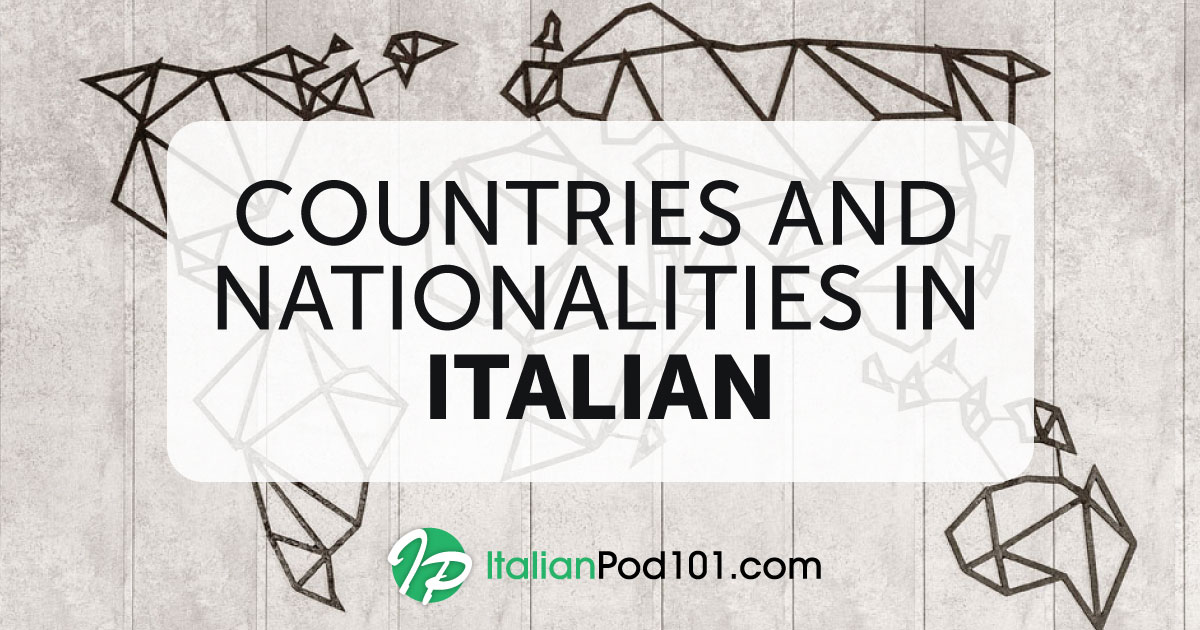
How many times have you found yourself at a loss for words when speaking Italian, or a little shy when starting a conversation in Italian with people you have just met? Or, after the person you were talking to is gone, you think to yourself… “I could have said this… I could have answered that…”
This is normal, but it is especially true for conversations in another language, where not all words, sentences, or structures might come to mind immediately.
This is why it makes sense to prepare a little “helper”, a “conversation kit,” to help get the communication going and to help improve your conversation in Italian.
In this guide, you will find conversation starters, appropriate reactions to specific questions, filler words and phrases, and everything else to improve your Italian conversation skills!

Get your cheat sheet ready and start a conversation!
 Table of Contents
Table of Contents
- Make Your Own Conversation Cheat Sheet
- Italian Reactions Words and Expressions
- Learn Italian Filler Words
- Questions and Answers
- Italian Conversation Starters
- How to Improve your Conversation Skills
- Conclusion
1. Make Your Own Conversation Cheat Sheet
1- What’s a cheat sheet?
To improve your conversation in Italian, a conversation cheat sheet is the best way to quickly improve your skills by making a set of Italian words and phrases, lines, or expressions that you can learn and easily access when you need to start a conversation. It is a way to feel more secure and to be sure to always have topics and arguments that are interesting to you.
In this guide, we will give you some hints and suggestions (and many more you can find online), but ultimately, you are the one that will have to put together this list based on your profile, personality, and interests. And, of course, the type of Italian people you will have to interact with.
2- Why would I need one?
A conversation cheat sheet is very useful if you are a bit shy, a little insecure, and if you want to be sure you don’t get stuck without things to say and topics to tackle.
In fact, you can always start a conversation in Italian by introducing yourself and talking about the things you do and like. But this will only take you so far. You better be prepared to ask and answer questions about different topics in order to build relationships and friendships.
3- How do I make one?
A good way to start making your own conversation sheet is to make a brief description of who you are and what you like. Maybe mentioning what you did in your recent past and what you like and hope for the future.
Here is an example of a possible personal introduction to include in your conversation starter. Make sure you mention any particular or unusual event or hobby in your life. Those make great conversation starters!
| Ciao, mi chiamo Jessica, sono americana e ho 28 anni. Da due anni, studio letteratura italiana all’Università di Bologna. Prima di venire in Italia, ho viaggiato molto e ho vissuto in diversi paesi. Sono fidanzata con un ragazzo brasiliano e mi piace molto leggere, cucinare e coltivare un orto in casa. |
| “Hi, my name is Jessica, I am American and I’m 28. I have been studying Italian literature at the University of Bologna for two years. Before coming to Italy, I traveled a lot and lived in different countries. I am engaged to a Brazilian guy and I really enjoy reading, cooking and growing a vegetable garden at home.” |

Start by writing a small introduction
- ➜ If you’re a beginner, the best place to start is definitely our blog article on How to Introduce Yourself in Italian. It’s freely available on ItalianPod101.
Then, you can elaborate on individual parts and imagine how you would answer specific questions by gathering phrases and words specifically tailored to your needs.
|
|
|
4- Getting off to a good start
Don’t worry if you think it’s too hard for a beginner! There are plenty of resources you can use, depending on your level:
- Online translators are great tools to get fast translations into the target language. Make sure you translate simple sentences, and the translations will be mostly correct. Google translate is the most popular option, but you can also find other good tools.
- Other online tools such as Reverso context can help you with idioms and expressions, and they give a very good idea of how certain words or expressions are used in context.
- ItalianPod101 has tons of free content, blog articles, and vocabulary lists you can use. The lists are especially useful if you’re looking for a specific topic, as they’ll provide sentences and vocabulary that suit your specific needs.
- A personal teacher is the perfect strategy for learning fast and hard. Your teacher can guide you through the process of writing your conversation cheat sheet and fix any tiny mistakes. Be sure to check our private coaching service from our Premium PLUS offer.
2. Italian Reactions Words and Expressions
Have you ever talked to someone who remained completely silent until it got really awkward and you couldn’t tell if they were still paying attention? This is what reaction words and expressions are meant to prevent.
In this chapter, let’s see how to react to a statement by expressing excitement, curiosity, annoyance, or disbelief. It will help make your conversations smoother and more lively, as well avoiding awkward silences that would make the other person uncomfortable.
That’s Great! – Bene! / Bravo!
| Q: Nel tempo libero gioco a basket. (“In my free time I play basketball.”) A: Bravo/a! Lo sport è importante. (“That’s great, sport is important!”) A: Bene! Possiamo giocare insieme qualche volta? (“Cool! Can we play together some time?”) |
Really? – Davvero?
| Q: Non sono mai stato/a in Spagna. (“I’ve never been to Spain.”) A: Davvero? È bellissima, dovresti andarci. (“Really? It’s beautiful, you should go.”) |
I’m sorry… – Mi dispiace…
| Q: Purtroppo non ho passato l’esame. (“Unfortunately I didn’t pass the test.”) A: Mi dispiace, quando potrai riprovare? (“I’m sorry. When will you able to try the test again?”) |
Unbelievable! – Incredibile!
| Q: Non mi piace la pizza. (“I don’t like pizza.”) A: Incredibile! (“Unbelievable!”) [Formal or Casual] A: Seriamente? (“Seriously?”) [Formal or Casual] A: Non ci credo! (“No way!”) [Formal or Casual] A: Scherzi? (“Are you kidding?”) [Casual] A: Scherza? (“Are you kidding?”) [Formal] |
That’s too bad! – Peccato!
| Q: Non posso venire al cinema. Devo studiare. (“I can’t come to the movie. I have to study.”) A: Peccato! Questo film è molto bello. (“Oh, that’s too bad! The movie is very good.”) [Formal or Casual] A: Che peccato! (“Oh, what a pity!) [Formal or Casual] |
Keep me updated! – Fammi sapere!
| Q: Forse riesco a raggiungervi più tardi. (“I think I’ll be able to catch up with you later.”) A: OK, fammi sapere! (“Alright, let me know!”) [Casual] A: OK, tienimi al corrente! (“Alright, keep me posted!”) [Casual] A: Va bene, mi tenga aggiornato! (“Alright, keep me posted!”) [Formal] |
- ➜ This is just a quick list of common reaction words and phrases, but you can find a few more in our blog article on Intermediate Italian Phrases on ItalianPod101.
3. Learn Italian Filler Words
Now that you have the foundations of your conversation sheet let’s change the tempo and talk about something slightly weirder. Academic studies can prepare you for many things, but when you start a real conversation, you’ll hear a lot of strange sounds and words that don’t ring any bells.
Italian Filler words are these short useless sounds and words that locals use to fill the gaps. They exist in every language I know, and you don’t necessarily have to use them unless you want to sound genuinely local. However, learning about them so you can filter them out is very important.

Eh… la mela o la torta? (“Uh, apple or cake?”)
Here are some of the most common Italian filler words:
| Italian: Eh… | English equivalent: “Uh…” |
| Vorrei un cornetto e, eh… un cappuccino. (“I would like a cornetto and, uh… a cappuccino.”) Eh… non so proprio cosa scegliere. (“Uh… I don’t know what to choose.”) | |
| Italian: Beh – Be’ – Bene | English equivalent: “Well” |
| Q: Vuoi ancora del vino? (“Will you have more wine?”) A: Be’, perché no? (“Well, why not?”) A: Vino? Be’ … non credo proprio. Devo guidare. (“Wine? Well… I don’t think so. I have to drive.”) | |
| Italian: Cioè | English equivalent: “Actually” |
| Vengo domani, cioè, forse vengo. (“I’ll come tomorrow, actually, I’ll probably come.”) Ti telefonerò, cioè, ti manderò un messaggio. (“I’ll call you, actually, I’ll text you.”) | |
| Italian: Allora | English equivalent: “Well” or “So” |
| Allora, cosa ne pensi? (“Well, what do you think?”) Allora, ci andiamo? (“So, shall we go?”) | |
Do you want to know exactly how Italians use this filler word? Watch this hilarious scene from a popular series: https://youtu.be/8U1F-XwTeNg.
| Italian: Vedi – Guarda (informal) Veda – Guardi (formal) | English equivalent: “You know” or “You see” |
| Vedi, non è una scelta facile. (“It’s not an easy choice, you know.”) Guardi, vorrei solo parlarle cinque minuti. (“I just want to talk to you, you see.”) [Formal] | |
| Italian: Mah – Boh | English equivalent: “Who knows…” or “Well” |
| Mah, non so proprio cosa fare. (“Well, I really don’t know what do do.”) Chi verrà alla festa? Boh! (“Who is coming to the party? Who knows!”) | |
4. Questions and Answers
Conversation is often made of a sequence of questions and answers. Like a ping pong match: you ask something, get an answer and another question, you answer and ask something else, and so on. Asking questions is the fundamental brick to getting to know someone, establishing a common ground, finding out something new or interesting, and simply getting the flow of the conversation going.
And formulating a question in Italian is particularly easy compared to other languages, as there is no particular pattern: no word order inversion, no adding of extra words. You simply change your intonation and make it sound like a question. Easy, right?
And then, of course, you can always add some typical Italian gestures if you really want to sound and look like an Italian!
And now, let’s get back to your conversation cheat sheet and to fill it with questions (and answers) relevant to your personal story and interests.

Questions… questions… questions…
“Where are you from?”
| Q: Di dove sei? [Casual] Q: Di dov’è lei? [Formal] A: Sono italiana, ma sono nata in Cile. (“I’m Italian, but I was born in Chile.”) A: Vengo dal Brasile. (“I come from Brazil.”) |
“Do you speak English?”
| Q: Parli inglese? [Casual] Q: Lei parla inglese? [Formal] A: Non parlo inglese. (“I don’t speak English.”) A: Sono fluente/madre lingua in inglese. (“I am fluent/native in English.”) |
“What do you study?”
| Q: Cosa studi? [Casual] Q: Che cosa studia? [Formal] A: Studio linguistica e letteratura. (“I study linguistics and literature.”) A: Sto facendo un dottorato in relazioni internazionali. (“I’m doing a PhD in international relations.”) |
“What kind of music do you like?”
| Q: Che tipo di musica ti piace? [Casual] Q: Che tipo di musica le piace? [Formal] A: Mi piace il jazz e la musica classica. (“I love jazz and classical music.”) A: Ascolto soprattutto musica napoletana. (“I mostly listen to Neapolitan music.”) |
“What’s your job?”
| Q: Che lavoro fai? [Casual] Q: Di cosa si occupa? [Formal] (literally: “What do you occupy yourself in?”) A: Sono idraulico. (“I’m a plumber.”) A: Lavoro nel marketing digitale. (“I work in digital marketing.”) |
“Why do you study Italian?”
| Q: Perché studi l’italiano? [Casual] Q: Per quale motivo studia l’italiano? [Formal] A: Perché adoro il suono dell’italiano. (“Because I love the sound of Italian.”) A: Per motivi di lavoro. (“For work-related reasons.”) |
5. Italian Conversation Starters
Starting a conversation could be a difficult part of communicating. And doing it in another language makes it just a bit more challenging. And also, you may have noticed that while talking to some people is very easy, with someone else, you almost have to get the words out of their mouth.
But don’t worry! Just have some sentences ready in your sheet, and follow our examples, and you will be prepared for every situation.
Here are a few examples that you can use with different people and in various situations:
- Ti piace la cucina messicana?
“Do you like Mexican cuisine?” - Cosa fai nel fine settimana?
“What do you do on the weekend?” - Come hai conosciuto il tuo ragazzo / la tua ragazza?
“How did you meet your boyfriend / girlfriend?” - Puoi consigliarmi un bel film o serie da vedere?
(“Can you recommend a good movie or series to see?”) - Come ti trovi in questa città?
(“How do you like this city?”)
- ➜ There are countless conversation starters for every situation: strangers, people you already know, colleagues, schoolmates, romantic dates. For many more examples, you could stop by our full guide on Conversation Starters, on ItalianPod101.

Cosa fai nel fine settimana? (“What do you do on the weekend?”)
6- How to Improve your Conversation Skills
1- Use every opportunity to practice
Yes, practice makes perfect. Or at least, it helps to gain confidence, rehearse different scenarios, and to learn what strategies keep the conversation flow going. So, don’t be shy and use every opportunity you have to talk to people. Strangers at the bus station, friends of your friends, and even online chats are good places to start a conversation.
And don’t worry if you make a few mistakes or if you can’t find the right word. Just keep practicing and improving your conversation cheat sheet and keep building on that.
2- Exposure to real content
Did you know that when you are exposed to a lot of spoken Italian, you will learn vocabulary, idioms, and even grammatical structures much faster and in a more pleasant way than just working on grammar books and courses?
And since speaking Italian to real people is not always an option (you might want to stay home, or you are not in Italy, or your friends are not available), a very good alternative is to immerse yourself in real content. You will have lots of options: from Italian music, to podcasts, to movies. There are tons of resources to learn Italian online, and, of course, one of the very best is italianPod101.com!
Reading is also a very good strategy to get familiar with a foreign language and to find interesting topics of conversation. Whether it’s the news, a novel, or the latest sport events, it’ll give you good material to discuss and, without even noticing, you will be learning new Italian words and phrases.
3- Find available partners to chat
If you are serious about improving your conversation in Italian, it is a good idea to find a partner to chat with in a consistent way. It could be another learner of Italian who is more or less at your same level, it could be someone interested in a conversation exchange.
What is that? You find a native Italian who would like to practice conversation to improve his/her English, for example. And when you meet in person, you can have a conversation half of the time in English and the other half in Italian. You can easily find lots of people interested in exchanging conversation. And you can probably find it also online!
Another way to go is by hiring a private teacher to make fast progress in your conversation skills, especially if you want to also improve grammar and pronunciation. You can likely find a private teacher or classroom-based sessions in your area, or subscribe to an online service such as our Premium PLUS coaching on ItalianPod101.
7. Conclusion
In this guide, you have learned how to improve your skills in speaking Italian. It all starts with making your own cheat sheet, then learning about various types of words and expressions specific to conversations: filler words, reaction phrases, questions, and answers. Do you want to share your thoughts about conversation skills? Do you want to know more Italian language learning resources? Let us know in the comments below!
On top of our bonus tips to improve your conversation skills, ItalianPod101 has tons of vocabulary lists with audio recordings and Free resources to boost your studies and keep your Italian learning fresh and entertaining!
Remember that you can also use our premium service, MyTeacher, to get personal 1-on-1 coaching and have your own private teacher to practice with BLEP words and more.
Along with assignments, personalized exercises, and recording audio samples just for you, your teacher will review your work and help improve your pronunciation. And keep having fun with ItalianPod101!
About the Author: Jessica Barbagallo grew up on the sunny island of Sicily, in the south of Italy. She has lived in Florence, Milan, New York, Vancouver, Rio de Janeiro, and São Paulo. After a career in digital marketing, she went back to what is most fun to her: teaching languages!










